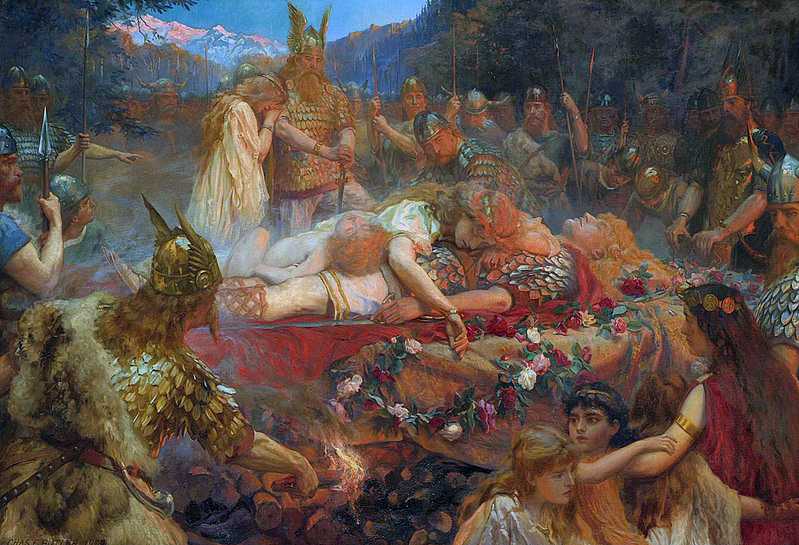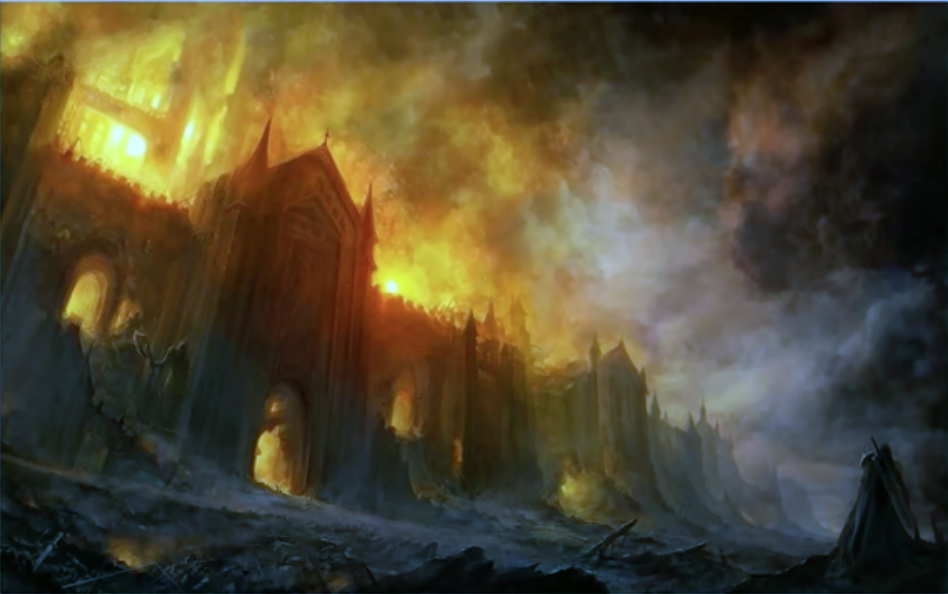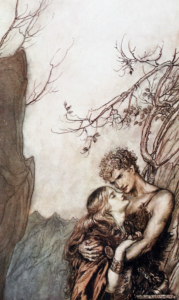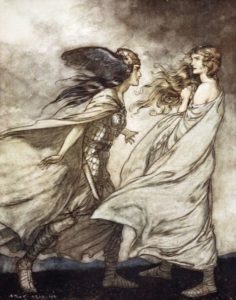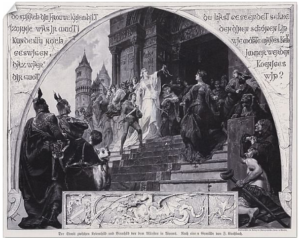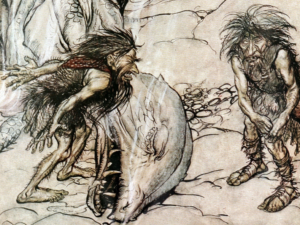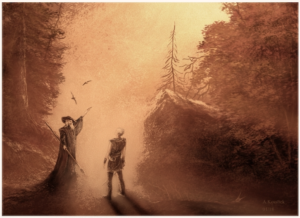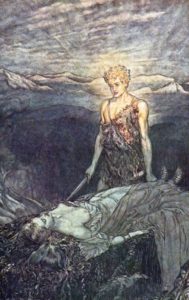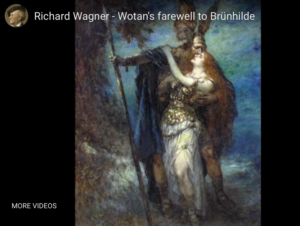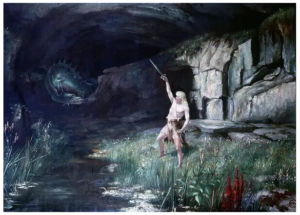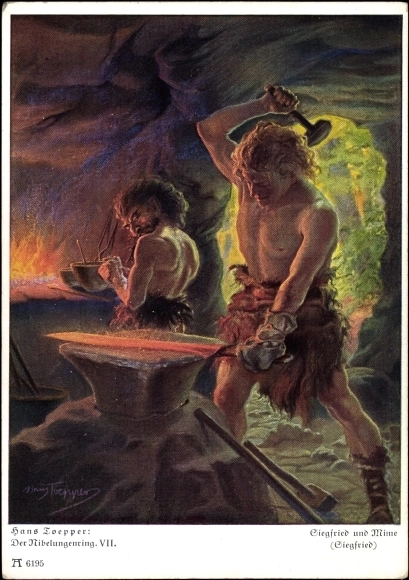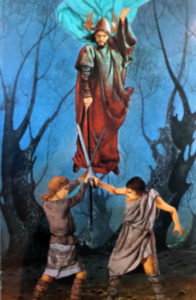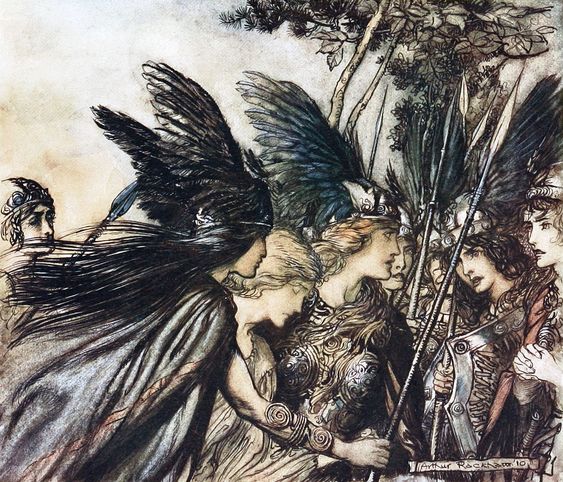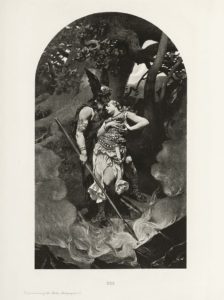Brunhild’s immolation
When Siegfried fell, pierced by Hagen’s weapon, everyone looked at each other in astonishment. No one could explain the iniquitous act of the prince’s half-brother. Only the prince knew the murderer’s intentions. Under the pretext of avenging Brunhild, Hagen was killing the hero by wounding him in the back. Gunther did not agree with this sinister plan, but he was too weak to oppose the decisions of his devious half-brother. When he saw his stepbrother finally achieve his purpose, he could not hide his regret. He was convinced of Siegfried’s innocence. He knew that it had all happened because of the loss of the hero’s memory, caused by the filter that Hagen poured into the wine that Gutrune offered to the guest the day after his arrival when they prepared the intrigue.
The prince gave the order to bring the hero’s body to the palace. The march through the forest was slow. Before the funeral procession reached its destination, Hagen announced it with his hunting horn.
Gutrune waited for the sound of Siegfried’s horn to follow.
A few moments passed, and the waiting became anxious. With a horrible thought, the princess went out to meet the retinue and rushed weeping over the hero’s body. Then, standing before Gunther, she rebuked him fiercely:
“How could you do this, brother, to avenge the outrage done to your betrothed wife, you have killed the man who loved me!”
With a sad accent, the prince replied:
“Disbelieve yourself, sister: there was no outrage at all. Brunhild could not be my betrothed, for she was already Siegfried’s wife. All this is the work of our half-brother. The evil filter he poured into the wine you offered our guest caused him to lose all memory of his past. But he fell in love with you and offered to win his own wife for me. Having lost his memory, he acted like a blind child. So do not speak of revenge. I had no part in Siegfried’s death. I am incapable of such cowardly action as you suppose.”
At that moment Hagen stepped forward and said in a firm and imperious tone:
“No revenge was the motive for the hero’s death. A wild boar rammed him from behind and stuck its tusk into him.”
“You were the boar, traitor!” Gunther burst out then, at the height of despair. “You wounded him from behind to carry out your sinister plans! But you won’t get away with it, wretch! You will not seize the magic ring!”
“The ring is mine,” said Hagen. “It belongs to me by inheritance. It belonged to my father, Alberich; it was craftily taken from him by Wotan, and now I, his son, have it back; and it can never be taken from me!”
“You will not touch the hero’s hand!” said Gunther, standing up before his half-brother, as the latter, with the fury of a wild boar, thrust his sword through his chest, killing him. Gunther fell heavily, to the horror of his sister Gutrune.
At the sight of the prince’s fall, the bystanders made ready to take up their weapons, but Hagen stopped them with a resounding voice:
“With this sword, I will defend my rights; woe to him who dares to oppose my designs! He shall fall as Siegfried fell, and as my half-brother fell; no foe shall escape my hatred and the strength of my arm, now that I wield this invincible sword!”
The warriors, overpowered by the imperious tone of Alberich’s son, drew back in fear, while Gutrune continued to shed bitter tears over the corpse of her beloved.
Brunhild appeared, who had seen and heard everything from inside the palace. With slow steps, she approached the group with the expression of a sleepwalker.
Before the Valkyrie reached Siegfried’s body, Hagen tried to tear the ring from Siegfried’s finger. But the hero’s hand was raised threateningly, and the evil one recoiled in terror.
Amid the general stupor, Brunhild’s voice rose solemnly:
“Let the wailing and weeping to cease! gather together the oldest and most stout trunks! Light the most gigantic pyre that ages have seen, so that the glow of the flames that are to consume Siegfried’s body may reach Valhalla, and with the ruin of the divine abode bring about the twilight of the gods!”
When the first tongues of flame reached the hero’s corpse, Brunhild climbed up to the place where the body had been laid and took the magic ring. Turning to the waves of the river, on the banks of which the pyre was burning, the Valkyrie said aloud:
“Listen, daughters of the Rhine, listen! Soon the ring forged from the gold that has been taken from you will return to you. I will put it on my finger, and when my body, together with Siegfried’s, turns to ashes, advance over the remains of the bonfire and drag us all down into the murmuring waters…”
For long night hours, the logs burned. When the ashes of the hero’s and the Valkyrie’s bodies mingled with the last remnants of the burning logs, the waves of the Rhine surged towards the pyre.
Hagen, who had been attentive, rushed forward in search of the ring before the waters carried it away. But at that moment the Rhine daughters rushed forward and swept him to the bottom of the river. Thus perished Hagen, the evil genius, swallowed by the waters, along with the ashes of Siegfried and Brunhild.
As the Valkyrie had foretold, the flames from the pyre reached the heavenly heights and set Valhalla on fire. The gods could do nothing to save the divine abode. Wotan watched the hurricane of destructive fire grow and pondered the causes and reasons for this ruinous end.
The perfidy of men had also taken hold of the minds and hearts of the gods. He himself had been unjust, driven more than once by anger. Now he saw Valhalla collapsing, consumed by the fire of evil passions. With the last glow of the fire in the high abode of the gods, the gods were entering their final decline. The darkened world had only the hope of a new dawn.
